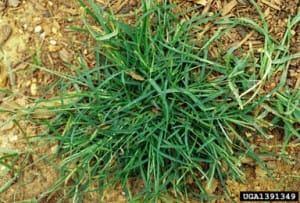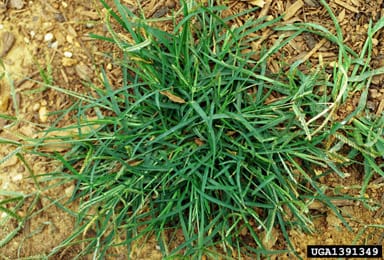Patrick McCullough, Associate Professor, UGA
The turfgrass industry is officially losing Illoxan (diclofop-methyl) and Embark (mefluidide) in 2015. These are two important tools in weed control programs with no comparable replacements. The loss of these materials has significant implications for resistance management, seedhead control, and efficiently managing high quality turfgrass.

Illoxan (diclofop-methyl)
Bayer will not be reregistering Illoxan. Unfortunately, the return on Illoxan sales was not worth the expenses of reregistration for the company. Illoxan is a postemergence herbicide used for goosegrass control in bermudagrass golf courses. This herbicide is one of the most effective chemistries for controlling goosegrass in greens, tees, fairways, and roughs. More importantly, Illoxan is the only ACCase inhibitor used in bermudagrass turf and the loss of this mechanism of action may have significant consequences for resistance management. Goosegrass resistance to ALS inhibitor herbicides, specifically foramsulfuron (Revolver), is becoming more widespread throughout the Southern U.S. Turf managers also have restrictions on MSMA use on golf courses that limit the ability to effectively control goosegrass and other weeds.
Illoxan is an excellent herbicide for controlling goosegrass at most growth stages in bermudagrass and also offered an alternative mechanism of action in resistance management programs. The implications of losing Illoxan in golf course management will emphasize the need for investments in good preemergence herbicides for goosegrass control. Dinitroanilines (DNAs) like prodiamine (Barricade, others) and pendimethalin (Pendulum, others) have potential to control goosegrass but results are often erratic. Resistance to DNA herbicides has also developed in goosegrass populations and alternative chemistries may be needed for effective control. From our research at UGA, Ronstar (oxadiazon) and Specticle (indaziflam) have consistently been the best preemergence herbicides for controlling goosegrass in bermudagrass turf. Other herbicides such as Dismiss (sulfentrazone), Sureguard (flumioxazin), and Tower (dimethenamid) have potential to control goosegrass but our results have been inconsistent over years.
With the loss of Illoxan, bermudagrass managers will only have Revolver (foramsulfuron), Tribute Total (foramsulfuron + thiencarbazone + halosulfuron) and Dismiss (sulfentrazone) available for postemergence goosegrass control. While these herbicides may control immature goosegrass, single applications often do not control tillered plants. Revolver and Tribute Total are both ALS inhibitors and will not effectively control mature goosegrass or resistant biotypes.
Turf managers may also explore the use of MSMA + Sencor (metribuzin) for goosegrass control but these treatments can be very injurious to bermudagrass in summer and may require sequential applications. Moreover, superintendents in Georgia are limited to one application of MSMA per year, not to exceed 25% of the total golf course. Turfgrass managers must understand that losing Illoxan may limit their ability to control goosegrass and may have serious repercussions in resistance management programs.
Embark (mefluidide)
Embark is a growth regulator primarily used for annual bluegrass seedhead control in turfgrass management. Earlier this year there was controversy around the future manufacturing of mefluidide, the active ingredient in Embark, and if this product would be available after 2015. PBI Gordon explored opportunities inside and outside of the U.S. to have mefluidide manufactured and formulated to make new Embark products. The opportunity to make new material was very costly for the company and PBI Gordon has decided not to pursue this investment. The Embark 2S product will be pulled completely, and there will be new Embark T & O 0.2L (essentially a dilution of the 2S) released until the current supply is gone. Once the existing inventory has been sold, Embark will no longer be available from PBI Gordon.
Embark is a growth regulator that has a long history of use in turfgrass and roadside management. Embark is the only seedhead inhibiting growth regulator available for use in warm and cool-season turfgrasses. Turfgrass managers primarily use this chemistry for seedhead control on annual bluegrass, tall fescue, bermudagrass, and other turfgrass species. Proxy (ethephon) is the other seedhead inhibitor available for turfgrass. It is labeled only for cool-season grasses but may be applied to certain zoysiagrass varieties. Proxy causes leaf chlorosis, stand thinning, and quality reductions in bermudagrass, seashore paspalum, and other warm-season species. Other PGRs like Primo (trinexapac-ethyl) or Trimmit (pacloburazol) may provide partial seedhead control but are generally less effective than Embark and Proxy.
Current research efforts at UGA include evaluating seasonal application timing of PGRs to minimize injury and maximize seedhead control on warm-season grasses. We are also evaluating alternatives to Embark, primarily ALS inhibitor herbicides, for seedhead management in bermudagrass turf. Embark is the most popular PGR for annual bluegrass seedhead control in bentgrass greens in Georgia and further research will be needed with Proxy, Proxy + Primo, and other compounds to replace Embark.
Patrick McCullough is an associate professor and extension specialist in turf weed science at the University of Georgia in Griffin.
